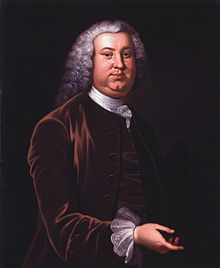Peyton Randolph
Peyton Randolph (born September 1721 in Williamsburg , Colony of Virginia , † October 21, 1775 in Philadelphia , Province of Pennsylvania ) was the first president of the Continental Congress .
Life
Peyton attended the College of William & Mary in Williamsburg and later studied at the Inns of Court in London . In 1743 he passed the exam, was allowed to work as a lawyer and became a member of the bar , the professional association of lawyers. He then returned to Williamsburg and was appointed District Attorney for the Virginia Colony the following year. He served several terms in the Virginia House of Representatives from 1748. In 1751, his dual role as public prosecutor and member of parliament led to an extraordinary conflict of interests.
The new governor, Robert Dinwiddie , had enforced a fee for the issuance of basic deeds, against the strong opposition of the House of Representatives. The House of Representatives selected Peyton Randolph to represent their case to the Crown in London. In his role as prosecutor, however, he was obliged to defend the governor's actions. Randolph went to London against Governor Dinwiddie's instructions and was briefly removed from office as prosecutor. On his return he was reinstated at the behest of the superiors in London, who also recommended that the governor abolish the fee.
In 1765, Randolph found himself in a dispute with new MP Patrick Henry over the question of responding to the Stamp Act . The House of Representatives commissioned Randolph to draft recommendations on the bill, but his more conservative plan was overruled when Henry obtained the ratification of five of his seven Virginias Stamp Act resolutions . This was done at a House of Representatives meeting that most of the MPs did not attend and the Randolph presided over without a speaker.
Randolph was dismissed as prosecutor in 1766. As the friction between Britain and the colonies continued, he became more and more a supporter of independence. In 1769 the Governor dissolved the House of Representatives in response to actions against the Townshend laws . Randolph was the Speaker of the House of Representatives at the time. He then presided over meetings of a group of former MPs in a Williamsburg pub who were working on responses to the UK government's unwelcome tax estimates.
Randolph was elected to chair both the First and Second Continental Congresses, in large part because of his reputation as Chairman of the House of Representatives. He no longer lived to see the independence of the nation he led; he died in Philadelphia and was buried in Christ Church. His nephew Edmund Randolph became the first United States Attorney General . There are two counties named after him, North Carolina and Indiana . Two ships of the United States Navy were named USS Randolph in his honor .
literature
- John J. Reardon: Peyton Randolph, 1721-1775. One Who Presided . Carolina Academic Press, Durham NC 1981, ISBN 0-89089-201-6 .
- Randolph, Peyton . In: Encyclopædia Britannica . 11th edition. tape 22 : Poll - Reeves . London 1911, p. 887 (English, full text [ Wikisource ]).
- Peyton Randolph in the Biographical Directory of the United States Congress (English)
- Peyton Randolph in the database of Find a Grave (English)
| personal data | |
|---|---|
| SURNAME | Randolph, Peyton |
| BRIEF DESCRIPTION | first President of the Continental Congress |
| DATE OF BIRTH | September 1721 |
| PLACE OF BIRTH | Williamsburg, Virginia |
| DATE OF DEATH | October 21, 1775 |
| Place of death | Philadelphia , Pennsylvania |

